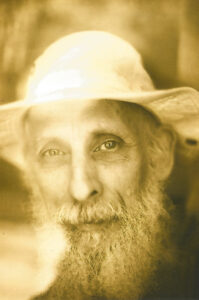This sermon was originally delivered to Moorseville Friends Church on First Day, Sixth Month 13th, 2021.
“Behold, I bring you good tidings of great joy, which shall be to all people,” said the angel of the annunciation. Quaker theologian Robert Barclay (1648-1690) argued that “if this coming of Christ had not brought a possibility of salvation to all it should rather have been accounted bad tidings of great sorrow to most people.” And so it would have been! There are other Scriptures to support the idea of salvation’s availability to all, too. 1 Timothy 2:3-4 KJV speaks of “God our Saviour, who will have all men to be saved and to come unto the knowledge of the truth.” The NIV puts it a little more forcefully: God “wants all people to be saved,” and the NRSV, God “desires everyone to be saved.” I’ve looked at the original Greek, which seems most forceful of all. There the word is thélei: God wills everyone to be saved! And since God is both almighty and supremely good, we can and should trust God to do all in God’s infinite power to get all of us saved, every Christian and every non-Christian. And what do we need salvation from? From everything we hate about ourselves, and about life – salvation from death, danger, sorrow, pain, and ignorance; from separation from hope and love!
But what stands in the way of our salvation is our sins and trespasses. If you’re at all like me, the best you can say about your own character is that you’re a sinner in recovery, and you have memories of things you’ve said and done that you look back on with shame and maybe disgust. But Jesus makes it very plain what you’re to do with those sins: forgive everyone else their sins against you! It’s right there in the Sermon on the Mount, right after Jesus teaches the Lord’s Prayer after He’s said, “Forgive us our trespasses, as we forgive those who trespass against us,” He reinforces the lesson by saying, “if you forgive others their trespasses, your heavenly Father will also forgive you; but if you do not forgive others, neither will your Father forgive your trespasses.”
Now, why should God withhold forgiveness? God gives most things unconditionally. Could God, who is beyond time and change, have sulky, unforgiving moods? No, God is “the Father of Lights, with whom there is no variation,” and 1 John assures us that God is Love Itself! It can only be because our door of forgiveness swings both ways: lock it so that no forgiveness gets out, and neither can forgiveness get in!
I won’t pretend that forgiveness is easy. For people molested as small children, for concentration camp and torture survivors, for family members of murder victims, I dare not “preach” forgiveness. I can only pray that Christ will make it possible. But I’m on fire with this message, Friends: that locking that door of forgiveness is the worst thing we can do. It’s how we damn ourselves.
Yes, Friends, I said “damn ourselves,” because I’m convinced that self-damnation is a real possibility, a real danger, and I feel called to warn sinners to repent while they can. I don’t know, or much care, whether hell is temporary or everlasting because even a split-second of level-eleven pain is intolerable.
Jesus, who surely had more knowledge about such things than you or I do, foretold a coming judgment, with the potential of a terrible condemnation, in warning after warning: The Parables of the Wheat and the Tares, of the Unforgiving Servant, of the Wicked Husbandmen, and of the Last Judgment put it unmistakably. Some of His accounts speak of an “outer darkness, where there is weeping and gnashing of teeth,” others, like the Parable of the Rich Man and Lazarus, warn of a never-quenched fire.
I’m alarmed to find that today the teaching is unfashionable, even among some Christian Quakers – as if God were too “civilized” to allow the cruelties of hell. A devout Friend once told me, “I can’t imagine that God would do that.” Yet God has permitted us to have terrible experiences in this world! Why not, then, in the next also? I showed my friend an account of a vision of souls in torment in a burning sea, witnessed by the young Quaker Joseph Hoag (1762-1846). My friend dismissed it as a mere “projection” of Hoag’s internalized theology. I suspect that “the god of this world” was at work here, blinding the mind of a good sheep he wanted to lead astray.
But we needn’t look back over centuries to the writings of our mystics, or across cultural fences to the doctrines of the Buddhists, Muslims, and Hindus, to find corroboration of biblical teachings about the fate of those who “die in their sins.” Today all it takes is an internet connection: go to your browser and key in “life review.” An estimated eight million Americans have come back from near-death experiences in which they’ve seen their life “flash before their eyes,” including the effects of their misbehaviors on others. It’s sobering. I’m not dealing here with questions of “is this The Judgment,” or “do we get second chances to repent after death,” but only “is there a judgment?” And there is. Count on it.
It’s of the utmost importance for lovers of God to trust in God’s kindness, and God’s willingness to forgive! We must remember that if God is all-knowing, God must experience every creature’s pain as well as every pleasure, so God cannot be allowing pain, in hell or on earth, beyond God’s own ability to tolerate. But the possibility of hell seems to be an inevitable by-product of human free agency, which in turn is part of our being made in God’s own image and likeness. If God had made us as robots that could only do God’s will, we could never become transformed into children of God. We must first be teachable creatures who can choose, then consciously sow, and then “reap whatever we sow.”
However, God has “no pleasure in the death of the wicked,” but rather wishes, with all God’s heart, that we would repent of the selfishness that stains so many of our actions. For there can be no salvation without repentance, without a cleansing of our conscience, without letting ourselves be grafted into the body of Christ, where His lifeblood can be always keeping our conscience clean, purifying our hearts to make them reliable sources of good! Above all we need to repent of that belief that we may “do evil, that good may come.” If the boss asks us to do evil so that a good paycheck will come, it’s time to find a new job!
Have you asked Christ to make you perfectly repentant? Today is the day to do it! He can! Do you remember that Jesus said He no will but to do the will of the one who sent Him? He can purify you till you have that same purity of motivation! – But start, I beg you, by identifying your grudges, your resentments, your areas of scorn and unforgiveness for the “others” you’ve wanted to feel superior to. Ask Him to lift them from you. And then remember this request you made whenever you say, “Forgive us our trespasses, as we forgive those who trespass against us.” You may feel God kissing you.

John Jeremiah Edminster (M. Div., Earlham School of Religion, 2019) worships regularly with Conservative Friends and hosts the Tuesday evening House of Light Friends’ Worship Group in his home in Richmond, Indiana. He carries a concern to promote surrender of self to Christ.

What does it mean to be a gathering space for thoughtful and creative reflections on the history, theology, and modern practices of the Church of the Brethren and related movements? Brethren Life & Thought has a long history of working to be such a space. We’re excited to bring our content online through DEVOTION: A Blog by Brethren Life & Thought. Here, you’ll find sermons and other writings from Brethren, Mennonite, and Quaker writers from a variety of theological and social contexts. Some weeks, you might read a piece that resonates with you. Some weeks, you might read a piece that challenges you. Some weeks, you might read a piece you think is heretical. For good or for ill, the Anabaptist and Peace Church movements are remarkably diverse in faith and practice. This blog attempts to expose our readers to the vastness of that diversity – even when it makes us uncomfortable. As you comment, which we highly encourage you to do back on our Facebook page, please remember to do so in light of our membership in the Body of Christ. Let us be different than the world for Jesus truly does invite us to another way of living.

